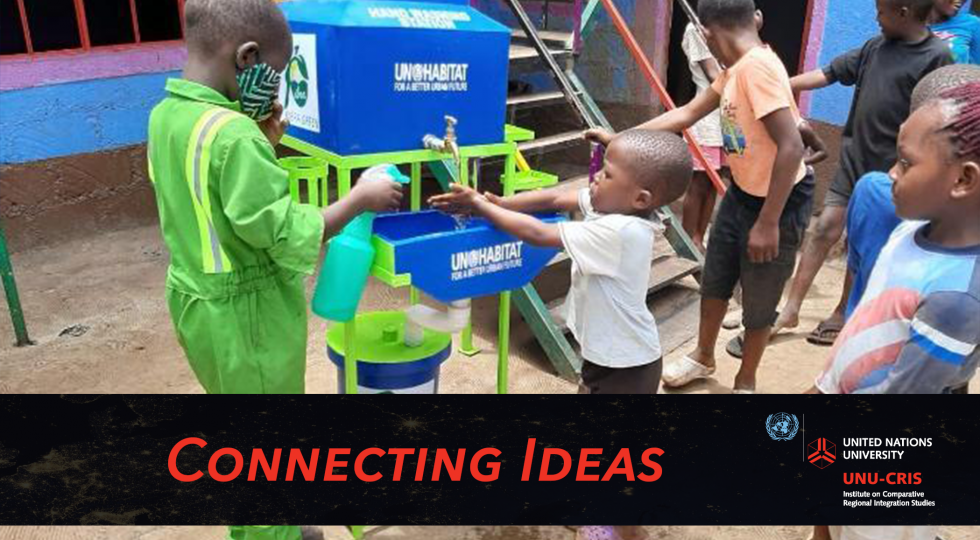Key Messages: COVID-19 and Informal Settlements


UN Habitat
19 May 2020 | #20.22 | The views expressed in this post are those of the author and may not reflect those of UNU-CRIS.
The COVID-19 pandemic will hit the world’s most vulnerable people the hardest including the one billion people living in informal settlements and slums worldwide. These areas are densely populated with inadequate household water and sanitation, little or no waste management, overcrowded public transport and limited access to formal health care facilities. In addition, they suffer from a lack of basic services, secure tenure and adequate housing. Urgent preparations are needed now to enable residents to stay safe and healthy.
Recommended measures to prevent COVID-19 transmission such as hand washing, physical distancing, self-quarantine, self-isolation or e community-wide lockdowns are often impossible in informal settlements. People do not have running water at home and must travel outside the home to collect water and use shared toilets. They live in crowded conditions and families often share just one or two rooms. In addition disinformation about the pandemic can spread rapidly in slums where residents often mistrust government messaging and policies due to experience with forced evictions, employment discrimination and public sector neglect
Many slum residents work outside the formal sector with unstable incomes and minimal savings. They will lose their livelihoods as cities shut down with no chance of any social benefits and will be unable to afford water, soap, food or medical treatment. Rapid, innovative deployment of an income guarantee, basic supplies and a social safety net are essential for communities to carry out the public health measures necessary to fight the spread of COVID-19 in their neighbourhoods.

As the loss of income from lockdowns and stay-at-home orders threatens the ability of residents in informal settlements to pay for rental housing. In addition, those who are homeless or living in grossly inadequate housing often suffer serious health problems and must be immediately offered safe, adequate shelter that permits social distancing.
In developed countries, national and local governments are acting swiftly to implement generous financial rescue packages in an effort to save jobs. These leaders have postponed mortgage payments, placed moratoriums on evictions and suspended municipal rents. However, challenges with informal settlements, migrants and the homeless remain in both developed and developing world cities. A similar effort will be needed by local, regional and national authorities in the global south to maintain livelihoods, prevent evictions and ensure everyone has adequate housing as enshrined in international human rights law.
At the same time, communities in informal settlements and slums have a powerful asset: resilience. They have an immense capacity to self-organize, identify their needs and tailor innovative low-cost solutions. They need to be empowered immediately, as preparedness is key.
Traditional and religious leaders along with youth and women organizers can effectively mobilize their communities, train volunteers, and lead awareness-raising efforts if given the right resources. Local governments need to ensure that community leaders have access to regular information updates, equipment and connectivity to engage with their constituencies. Measures should include the provision of nearby facilities for testing, self-isolation and health care.

The basic human right of access to affordable water and sanitation is now a matter of life and death. Safe handwashing is an inexpensive and highly effective way to slow the virus spread so access to affordable or free, water and soap is a minimum requirement. Hand-washing stations, connected to water tanks or via piped water expansion, combined with basic hygiene awareness, are essential. Ramping up the availability of such basic infrastructure is one of UN-Habitat’s top priorities. COVID-19 has also been found in wastewater, so urgent attention must be paid to safe sanitation especially as slums mainly have onsite systems.
Now is the time to act. National, regional and local governments need to ensure that there is specific focus in their response plans to prepare for and respond to outbreaks in informal settlements and slums and that they mobilize partners and financing.
This is a wake-up call for all of us to join forces to build the resilience of informal settlements and slums to protect against the pandemic and mobilize global coalitions to find structural solutions to the very problems which render them so vulnerable.
By joining forces, the world can emerge stronger from this crisis and move closer to achieving the Sustainable Development Goals by enabling inclusive, safe, resilient and sustainable cities and communities to thrive and prosper.
More on COVID-19 in the Connecting Ideas series:
We Go Digital: The South Korean Case and Sustainable Digital Transformations
Disrupted Latin American Integration: Challenges to Business as a Result of COVID-19
Is Lockdown the Same, Everywhere, For Everyone?
East Asia and Pacific: Countries Must Act Now to Mitigate Economic Shock of COVID-19
COVID-19 (Coronavirus) Drives Sub-Saharan Africa Toward First Recession in 25 Years
COVID-19: An Opportunity for Regional Cooperation in Latin America?
The Irresistible Rise of Health Diplomacy: Why Narratives Matter in the Time of COVID-19
Trade Policy and the Fight Against the Coronavirus
When China Sneezes, Asia Catches a Cold
Yes, Crises Do Happen: A Plea for Feeling More Vulnerable After COVID-19
What Can the Coronavirus Teach Us About Regional Integration in Health?
